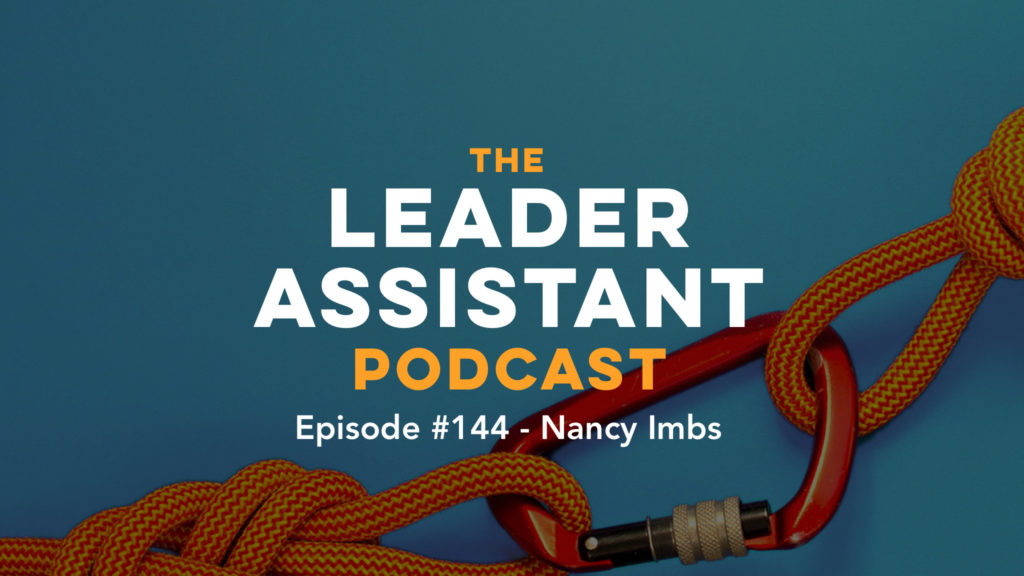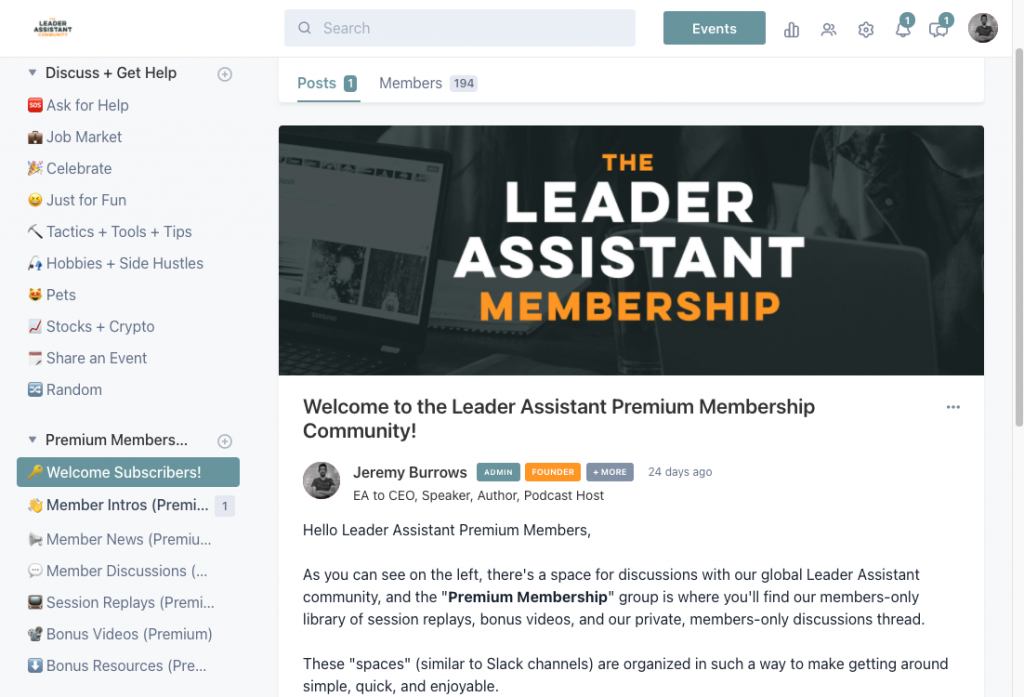Nancy Imbs is a leadership and professional development consultant with a passion for helping you become more confident and successful in business and beyond.
In this episode, Nancy talks about emotional intelligence, giving helpful feedback, and managing difficult conversations. Enjoy the show!
THIS EPISODE’S FEATURED SPONSOR
Stressed about holiday gifting? Don’t be. With Loop & Tie, giving great gifts is simple. Here’s how it works. You choose a curated collection of stylish, artisan-made gifts at prices from $10 to $500 per gift. Then, your recipients get to choose their own gift from the collection you send.
Go to loopandtie.com and use promo code LEADER ASSISTANT (All caps, 2 words) for 20% off*.
And yes, they do ship internationally so visit loopandtie.com today!
*Max 20 gifts per personal account. For international and custom gifting solutions, reach out to the Loop & Tie team here. Offer expires 12/31/2021.
LEADERSHIP QUOTE
Anything is possible if you believe in yourself.
CONNECT WITH NANCY
- Nancy on LinkedIn
- Website: stlpolished.com
ABOUT NANCY
Nancy is an empowering leadership and professional development consultant. Highly dedicated and results oriented, she has the skill and passion for helping individuals become more confident and successful in business and beyond.
Drawing on her marketing and communications background, over 25 years’ experience in leadership roles and a lifetime of personal growth, Nancy has keen appreciation of mindset and the power it has to change patterns of behavior. She focuses on building one’s strengths and minimizing weaknesses through enrichment, feedback, self-discovery and action plans.
A graduate of the University of Missouri School of Journalism and certified by The Protocol School of Washington, Nancy is an author of a children’s book and a dynamic motivational speaker. She appears monthly on CBS-affiliate KMOV’s, News 4 Great Day and on KTRS radio. She is a source for many other print and TV media.
Nancy believes passionately in developing people, especially their interpersonal skills. “You can achieve your goals – you just need a clear vision and a strong belief in yourself,” she says.
THE LEADER ASSISTANT PREMIUM MEMBERSHIP
To learn more about how you can join the now 200+ growth-minded Leader Assistants, check out our Leader Assistant Premium Membership for ongoing training, coaching, and community.
LEADER ASSISTANT LIVE EVENTS
Check out our constantly updated schedule of events for admins and assistants at LeaderAssistantLive.com.
THE LEADER ASSISTANT BOOK
Download the first 3 chapters of The Leader Assistant: Four Pillars of Game-Changing Assistant for FREE here or buy it on Amazon or Audible.
JOIN THE FREE COMMUNITY
Join the Leader Assistant Global Community here, or the Facebook Group here for bonus content and to network with other assistants who are committed to becoming leaders!
SUBSCRIBE
Subscribe to The Leader Assistant Podcast so you don’t miss new episodes!
You can find the show on Apple Podcasts, Spotify, Google Podcasts, Pandora, and Stitcher.
Join my email list here if you want to get an email when a new episode goes live.
LEAVE A REVIEW
If you’re enjoying the podcast, please take 2 minutes to rate and review the show on Apple Podcasts here. Each review helps me stay motivated to keep the show going!
—
EPISODE TRANSCRIPT
Nancy Imbs 0:00
Hello, my name is Nancy Imbs and with polished, glad to be here today and I have a quote I’d like to share. It’s about the ability to do anything you want and it’s about confidence. So if you believe in yourself, anything is possible.
Podcast Intro 0:18
The Leader Assistant Podcast exists to encourage and challenge assistants to become confident game changing leader assistants.
Jeremy Burrows 0:29
Are you stressed about holiday gifting? Don’t be with loop and tie. Giving great gifts is simple. Here’s how it works. You choose a curated collection of stylish artists and made gifts at prices from $10 to $500 per gift. Then your recipients get to choose their own gift from the collection that you send. Go to loopandtie.com and use promo code LEADER ASSISTANT that’s all caps to words LEADER ASSISTANT to get 20% off. And yes, they do ship internationally. So visit loopandtie.com and use the code LEADER ASSISTANT for 20% off. Hey friends, thanks for tuning into The Leader Assistant Podcast. It’s your host, Jeremy Burrows. And today I’m very excited to be speaking with Nancy Imbs. Nancy is the founder of polished and we’ll get into more about what polish is and how she helps leaders. But Nancy, thanks for being on the show, first of all.
Nancy Imbs 1:39
Well, it’s my pleasure, Jeremy, I’m thrilled to be here.
Jeremy Burrows 1:42
And what part of the country are you in?
Nancy Imbs 1:44
I’m in the small of the Midwest, St. Louis, Missouri.
Jeremy Burrows 1:48
Very nice. Well, as many know, I was in St. Louis, for 16 years or so of my life up until last year. And so just moved back to Kansas City, Missouri, but still in Missouri. So it’s always fun to interview, a fellow Missouri and so welcome.
Nancy Imbs 2:05
Thank you. I’m glad that you you feel the same way about St. Louis. It’s a great place as as Kansas City.
Jeremy Burrows 2:13
Awesome. Well tell us a little bit about your career, how you maybe what your first job was, and then kind of how you transition into your experience and what you learned and why you started polished.
Nancy Imbs 2:27
Okay, sure that sounds great. So yes, I started my career right out of the gate after graduating from the University of Missouri. This was in Columbia. They have a great journalism school and I was a graduate of the journalism school. So my first real job was an editorial assistant for St. Louis magazine. I have had other jobs waitressing and bussing, tables, etc. But this is sort of was on my path to my career. As a as a editorial assistant for St. Louis magazine, I was responsible for checking for you know, proofreading ensuring that the copy was clean, there were no typos or grammar mistakes. And they also gave me a column which was a monthly column the magazine was out every month. And I maintain this it was called touts at the time. And it was getting different products from different stores and touting those in hopes that people would, you know, frequent or visit these small businesses as well as hate to say this because there’s always advertising involved with the magazine, potentially advertising for the magazine. So that was my first my first job and chasing police cars and fire trucks. After that came as a reporter for the St. Louis Post Dispatch, I worked for the Dallas Morning News, and really just kind of did everything that a reporter would do. I have this this pension for curiosity, I like to ask questions, I’d like to get to the root of a problem. And so really worked well in my career. But as I was growing in age, if you will, I also was starting a family and not that the reporter gig is not a good good job because it gave me great satisfaction and I was passionate about it, but I I needed to kind of transition to where maybe it was a little more financially rewarding. And so I left that that the reporting or the media sector to work in the marketing and communications arena and still using my skill set of writing and communicating but just focusing on kind of in that marketing space. And so I did that and and I’ve had the fortunate experience of working with various administrative assistants, executive assistants, office assistants, Office admins, etc. And really I grew this kinship with them. And it’s funny now that I’m, you know, into seven years of my own having my own consulting practice as a professional development consultant. I it’s, it’s strange or wacky if you will have things just kind of come full circle. I have found a niche with admins and executive assistants not only do I connect well with them, I feel like I really have this appreciation and empathy. But I have great relationships with lots of different organizations and get get to travel to various conferences, I do blogging for various trade orgs, etc. So it’s kind of a long winded answer, Jeremy but starting off as a journalist and then transitioning into the marketing communication space and then landing kind of finally finally, finally listening to my fire in my belly this, this fire was becoming an inferno. Nancy, start your own business you want to do this do it had this fear, just like all of us, we have, you know, no risk, no reward, so to speak, but also to Holly, I was getting insurance, health insurance. Through my company, I had a great assistant who had my back, I had a 401 K, I had a steady paycheck, you know, all these wonderful things that we can take for granted. But this this, this noise inside me was becoming to the point where I really needed to stop and pay close attention to really what was going to be meaningful in my life. So I launched polished like seven years ago, roughly. And my biggest regret, and I’m saying this for for future entrepreneurs are I know you juggle lots of balls and have different things going on in different businesses. Jeremie going on. Don’t don’t not do it, right, the net will be there jump the net will be there as what I like to tell people, yes, there’s always a job that we could go to if we fail, but if we don’t really listen to our heart, and what what our passion is, then sometimes we’ll we’ll be at that point in our life where we’ll have a regret. So,
Jeremy Burrows 7:12
yeah, well, thank you for the short version of your story and career. Tell us maybe a couple of stories or about your experience working with executive assistants.
Nancy Imbs 7:26
Sure. Well, as you as you know, Jeremy, preaching to the choir here. executive assistants are are the pulse, they’re the heartbeat of an organization. They’re the ones who not only focus on the now factors and things that will have to be done today, scheduling, making sure that invoices are sent out expenses are paid, etc. So I’ve I, I, before I launched polished, I was working for a fairly large healthcare organization, based in St. Louis, but they were all over the Midwest. And I was I was the VP of marketing and branding for the foundations. And they had at the time, they’ve since grown because they’ve purchased more hospitals. But at the time, there were over 19 foundations within the hospital system. And so I had the privilege of working with an a rockstar of an admin. And she, she was the type of person that could anticipate your needs before you even asked her. So working with and I’ve before that, obviously, in my career, I’ve had the privilege of working with other admins, my experiences, quite frankly, are there the can do people, most of them have this, this, this level of Give it to me and I’ll get it done, you know, just very assertive, detailed oriented, high level of respect for people. And you don’t often see that today. But you know, with COVID Obviously, we’re so much in the virtual space, but even face to face before COVID Before the pandemic, you know, people can get, you know, our tempers could flare, but it seems like the admins always maintain this level of respect this decorum. We’re really their soft skills. always were. They raise the bar, most always in the workplace. So I’ve great I have great experiences working with admins.
Jeremy Burrows 9:44
Nice. So tell us about let’s let’s kind of go over a couple of different topics. Speaking of soft skills, emotional intelligence. So I talked about emotional intelligence in my book, briefly and how I believe it’s The key part for assistants to future proof themselves as more and more automation takes away some of those repetitive tasks that we all do, but specifically that assistance do you know, emotional intelligence is one way to stand out and future proof yourself, because human being human is becoming more and more important in the automated age that we’re in. So, could you tell us just a, share some tips on how we can develop our emotional intelligence?
Nancy Imbs 10:42
Yes, and thank you, Jeremy, I, like you look at emotional intelligence as sort of the apex of leadership skills. And I really love the theories and the principles behind Daniel Goleman. He is, if you will, the 21st century guru of emotional intelligence as behavioral psychologist who really outlines that these five leadership domains that that help, you know, elevate you to a higher level of leadership. And so one of them is this area of self awareness, self awareness, and empathy, are two of these top leadership skills that most admins possess. And it’s interesting, because they’re the ones who, you know, as you know, wear all the hats, often in their job. And they are so self aware in their jobs, skill sets, their competence, their emotions, their triggers, that they they are almost cloning themselves to their boss. In other words, they, their manager, whomever, they’re the one to who knows how their boss based on their boss’s emotions, or just their, his or her demeanor, they’re the ones who can tweak their behavior, right, their emotions, to enable to have you know, this, this conversation that is clear and concise. And then the empathy factor, I mean, golly, admins juggle so many tasks. And yet, they have this this, this empathy, this compassion, to want to help. And to be the right hand man, not only to their direct report, but also to others in the department, I’ve seen it more often than not, which can be a curse sometimes. Right? It’s like learning how to say no, in a positive way. But emotional intelligence, you know, as you said, in your book, it’s all about the ability to be aware, and to manage emotions and relationships. And also, what’s the ability, ability to moderate your emotions effectively. And I’ve seen time and time again, we live in a very stressful competitive global work world today. And it’s easy to not practice great self management or self regulation skills. But over and over again, it’s these Rockstar of admin to know, I don’t know, if there’s, you know, their time management skills, they just know, how to, you know, put things in perspective, and not, you know, have a knee jerk reaction.
Jeremy Burrows 13:33
What would you encourage assistants to do when their executive is not very emotional, intelligent,
Nancy Imbs 13:44
oh, boy, ding, ding, ding, ding, ding. And we’ve all have had experiences, whether they’re your boss or a friend or colleague, whatever, where perhaps, you know, they have zero emotional intelligence. And you know that, because you want to balance the beauty of emotional intelligence. And I’m going to give us a quote that David Goleman uses all the time. In essence, we have two brains, one that thinks, and one that feels and you have to have that balance. But if you have, you know, like, think of a seesaw, if you have one that’s so top heavy, and it’s just the emotional part, holy cow that is going to be destructive, potentially, to your career. And conversely, if, if you flip the teeter totter to the other side, and you have one who’s just so logical, that can be very hard to communicate and be productive with somebody because they’re not admitting any emotions. They’re focused on, you know, logic and data and give me the facts and nothing but this facts and, you know, no small talk and all this and that so it’s difficult to gain that rapport. So when you work with somebody who has zero emotional intelligence, And that tells me that they’re either very logical or so left brain, that it’s tricky. But there is a way that you that you can, you can get over this this challenge. And what I would suggest is just with different personalities, like we’ve all worked with people who are maybe tightly wound or maybe very blunt or direct, you have to almost talk, your personality styles mirror that personality style, because they may not have the breadth of even that, even if they’re a senior level, executive or leader, they may not know how to turn the switch to a different way. So if you if you can, and I hate to say this, but mirror a little bit of their personality, then you’ll be able to have get a better better rapport and better consistency with your with clarity with your communications.
Jeremy Burrows 16:01
So basically give them a taste of their own medicine, what you’re saying.
Nancy Imbs 16:04
Yeah, I mean, it sounds sounds awful. But but but but the other thing is, if you, you know, some people, like a left brain, and it’s very difficult to talk to somebody who lacks emotional intelligence, because empathy, I mentioned, self awareness and empathy are the two top leadership skills, you wouldn’t believe the empathy training that’s going on right now. And that C suite because they’re lacking it, and there’s become this movement now where we should have empathy in the workplace. And there’s an I don’t want to get on a whole different topic. But there, there is all these gender disparities today, for example, you know, a man cries, he is empathetic, he’s compassionate, he’s caring. Now for women cries in the workplace, we’re out of control, we’re emotional, were hard to deal with, right. And so there’s, you know, or even communication skills, if a man was very, you know, assertive, that’s polished, that’s great. He’s getting his message across, people are listening to his every word. But if a woman B was very sort of in her language, then she, you know, hate to say the B word, but you know, she gets to she gets coin, bossy, or, or, you know, all these negatives that come with it. So there’s, there’s this these gender equality inequalities that happen and we even with soft skills, that I think as women, we owe it to ourselves to kind of help advocate to kind of eradicate those those disparities.
Jeremy Burrows 17:43
Yeah. Have you
Nancy Imbs 17:44
ever seen that Jeremy, where, you know, if somebody preps you, for example, we’re sharing something in an articulate a sort of way, and then a woman chimed in and did the same? She may be a little overbearing, but she’s not.
Jeremy Burrows 18:02
Yeah, no. Yeah. Unfortunately, it’s definitely prevalent in corporate America, really the world? But yeah, some of that, especially assistants who are 90, you know, what is it 97% female in the world have to deal with that all the time. So, yeah. Okay, so that was super helpful. Thank you so much for for sharing, I want to cover two other topics. Before we wrap up. First one is giving feedback. So in giving effective feedback, the scenario maybe is you’re an executive assistant, and you’re trying to work well with the Chief chief of staff in the office. And you have to give some feedback that maybe it’s some difficult feedback for the other person to hear. By but you want it to be professional and effective. What are some tips on getting effective feedback?
Nancy Imbs 19:02
Yes, so one of the and I agree with you difficult conversations are just that difficult. But we haven’t really talked about and I’ve been using the word assertive, assertive, assertive when you use when you speak in the assertive way, that that ultimately allows you to stand up for yourself, yet respect others and get that win win. It’s something that most of us don’t really take advantage of. But a sort of communications quite frankly, is the way to deliver difficult conversations or any type of communication for that matter. But when you when you deliver that conversation, there’s there’s like three skills or three different elements that one should possess, one is the confidence and you have to come in prepared. You have to come in controlled, right? And just like anything, you you want to be consistent so life is not always just a bed of roses. We’re going to have difficulty times and and and lots of those difficult times require having that tough conversation. So going in with this preparation, and even if you’re not confident in yourself, there’s lots of ways that you can boost your confidence. And that is through being being prepared, knowing what you’re going to say, speaking in a controlled assertive manner, the other the other part that is very important is to be clear. Often will, will talk in circles, we won’t want to hurt that person’s feelings will accommodate them. And, and because it’s a difficult topic we don’t want to have, but if you’re clear, that confidence will start to come through. And it’s, it’s, it’s almost like magic, I mean, things just flow fluidly out of your out of your mouth. And the other the other way to deliver this is being concise. We don’t want to ramble, we want to, obviously deliver our information in a controlled manner, like I was saying, but we don’t want to go into situations, especially if we know that it could kind of trigger. Now, if we were in a negotiating arena, and we we wanted to, you know, have him look at your side, then of course, we’ll say things that were trigger, that will create a little trigger moment. But if it’s a difficult conversation, you always want to be you know, respect empathy, having that self awareness, thinking about how that person would feel right, but always in the, in the assertive way. So being relaxed, keeping your voice relaxed, delivering the information in a calm, controlled way. Respect, like any other skill, it just it takes practice, but the toughest part is doing it. But if you go in prepared with the number one rule, chances are, you’ll get this this mutual resolve and it won’t be as as tough as you thought it after the end.
Jeremy Burrows 22:04
So would you recommend like, writing out word for word, what you’re gonna say?
Nancy Imbs 22:09
No, I mean, I don’t think we want to be. That’s the only thing it’s like, you know, everybody can spot a phony baloney of or scripted, or we’re reading from cards, you know, being yourself throw away, you know, you’re no cards, remove your spectacles, focus on that person with eye contact, talk to them in a way that’s authentic, you being real, most people will respect that side of you, of course, we want to, you know, we have to say what’s the most difficult thing to say? Now, I’ll give you a quick little example, I had a situation where a teammate of mine who reported to me always would come into my office very upset it was every single day coming into my office and crying, having problems at home was not unhappy, was unhappy with himself, it was really I had a lot of empathy for him. And I felt you know, I felt like I get it, I was walking into shoes, sometimes I but when it kept repeatedly happening, I finally had to say to him, and this was a difficult conversation. But I said it in a controlled, clear, confident way. And I said, Look, Joe, I get it, and I feel for you, but but your your work is starting to really slack off here and everybody else is having a pickup, you know, what you you’re not able to manage. So basically, I’m going to offer two opportunities here, I’d like you to take a little bit of time off just to kind of get get things together here, come back in three days, okay. And then take advantage, you know, because at the time in this work setting, we had resources to help, you know, with with counselling or such, and but but and I said now, we’re going to we’re going to do this, you’re going to talk to somebody and you’re and you’re going to really focus on getting your your mind stronger. But if things aren’t working out, I will will have to, you know, I don’t want you to leave but I may have to put you at a lesser role until you can get back in control. It was a very difficult conversation, especially with his mindset. But as it turned out, he did get this he did seek help. He ended up getting demoted which is terrible, but it was the best thing for him. He’s happy. He said that was too stressful for him. He didn’t he couldn’t manage all this. He knows he has growth opportunity but for now he’s doing great and sometimes when you when you share resources or or options or alternatives to whatever that topic is discussion is that opens the door to possibilities of improvement.
Jeremy Burrows 25:06
Love it. So what happens when? Or what would you do if it went south? So if you go in and you’re, you keep it short and sweet to the point professional, don’t let the emotions get into it, but then the other person just flips out. How do you respond in those scenarios?
Nancy Imbs 25:24
Yeah, well, again, you have to maintain this as sort of calm, cool, collective person. We don’t want to react like that person. You know, we’ve all had experiences, I’m sure where we’ve regretted. That’s why I always, I always say, take the 24 hour rule, you know, do not send that email, do not have that conversation, go home sleep on it. And I guarantee you the next day, you will have a whole sense of urgency or not. So take the 24 hour rule. But in this situation, if somebody is really acting, you know, in a way, that’s, you know, not what you expected or just out of control, you might have to say, you know, what, this is a timeout, we just need to, I think we need to take timeout, let’s let’s, let’s talk about this tomorrow, or let’s set a time next week. Because it’s clear that that you’re upset, and perhaps you’re not thinking clearly. I’m happy to continue the conversations, but I think we really need to take a break right now.
Jeremy Burrows 26:25
Nice, nice. Yeah. That’s the space taking space, when that’s the hardest part, in my opinion, for with most motional intelligence, is taking space when you just want to, like, get it out of your system right now. It’s like, alright, take a deep breath. Yeah, you know, and process it and respond instead of react.
Nancy Imbs 26:50
Yes, and that’s the beauty of, you know, one of Daniel Goldman’s leadership domains is self regulation. And sometimes if you feel like you’re losing control, or you’re not controlling, you’re letting your impulses control you, then, you know, if you’re in a meeting, you can say, you know, what, I’m going to, um, excuse myself and just grab some coffee, or I’m going to ask if we can table this discussion for later in the day, you know, go outside, go for a walk, take deep breaths, do some meditation, whatever it is, these are things that will deliberately and effectively help you kind of calm down a bit. Because you’re right. I mean, it’s great to emote these happy, joyous feelings. And you know, when we’re so happy for somebody when we’re self, you know, and that’s how we’re not self regulating, that’s okay, you know, somebody’s past the bars or, or an admin just, you know, celebrating her birthday. And when somebody brought in a big birthday cake for her, we can be joyous and excited. But it can really, you know, impair impede your career, if you become too emotional and have these reactions that are out of professional line. So we just, we just need to be really mindful of that, because it can really derail your career.
Jeremy Burrows 28:11
Yeah. Well said, Well, Nancy, this has been super helpful. And I know, it’s just the surface of a lot of these issues. That I know many assistants listening are probably really intrigued and want to want to go deeper. But you know, as they say, that’s all the time we have on the on the show for today. So how can people connect with you reach out to you if they want to dig deeper and learn more?
Nancy Imbs 28:41
Oh, yes, of course. Well, I invite you to email me at Nancy@STLpolished.com . Feel free to shoot me an email, or go to my website, which is STLpolished.com. And you can actually send a question through the Contact page, I’m very good at responding. I want to help I get it. You know, I may not have been an admin, but I get I get the stresses of real life work. And I would love to be your support. So if you had, if you have any questions, please don’t hesitate to reach out and I’ll be happy to share my two cents.
Jeremy Burrows 29:26
Perfect. Well, we’ll put those links in the show notes so people can reach out. And yeah, thanks again. Enjoy St. Louis. On the other side of the state, about three and a half hours. Yeah, go chiefs. They’ve had a rough, rough start this year. But I know hopefully I can listen to this podcast episode in the future and think, oh, they really came came out of that strong.
Nancy Imbs 29:50
Absolutely. And I look forward to reading your book, Jeremy. Yeah, thank
Jeremy Burrows 29:53
you. All right. Well, take care. And thanks so much for being on the show. My pleasure. Thanks again for listening to my conversation with Nancy. Check out the show notes at leaderassistant.com/144
Unknown Speaker 30:17
Please listen you on Apple podcasts goburrows.com









